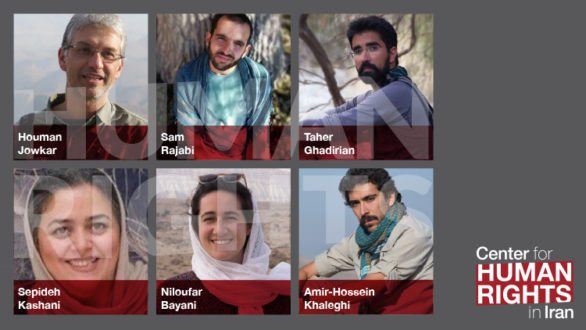CHRI – “No one knows if they are well or where they are being held.”
Several environmentalists who were arrested by Iran’s Islamic Revolutionary Guard Corps’ (IRGC) Intelligence Organization in January 2018 continue to be denied access to legal counsel more than six weeks into their detention.
“The families want to know what the charges are so that they can visit the detainees in prison and exercise their natural right to get a lawyer,” a source with knowledge about the case told the Center for Human Rights in Iran (CHRI) on February 28, 2018.
“Some of the detainees have had several brief [telephone] contacts with their relatives but it was nothing more than exchanges of greetings,” added the source who requested anonymity for security purposes. “No one knows if they are well or where they are being held. Some of the families have been told that the charges are in connection with ‘national security.’”
The known detainees—Sam Rajabi, Niloufar Bayani, Morad Tahbaz, Amir-Hossein Khaleghi, Taher Ghadirian, Houman Jowkar and Sepideh Kashani—are current and former staff members of the Persian Heritage Wildlife Foundation (PHWF). The non-profit organization’s managing director, Kavous Seyed-Emami, died in custody in an alleged “suicide” on February 9, 2018, some two weeks after he was arrested on January 24.
CHRI has learned that agents belonging to the IRGC’s Intelligence Organization detained Iranian-American Morad Tahbaz, a PHWF patron and board member, two weeks prior to the arrest of the other detainees who were taken in on January 24 and 25, 2018.
“Some agents came to the [PHWF] office on January 24 and showed a group picture of current and former staff members and ordered them to come to the office,” said the source. “Then, at 9 pm, three male and one female agent went to [Amir-Hossein] Khaleghi’s father’s house. They showed a warrant but it was so quick that his father didn’t get a chance to read it. The agents were polite and asked the father to remain calm. They searched and confiscated personal belongings such as laptops, memory chips and hard discs.”
“The last time Khaleghi contacted his family was 10 days ago [February 19] when he spoke to his mother [on the phone],” continued the source. “The family has been told not to come to Evin Prison to ask questions and wait to be informed by the authorities. One of the investigators spoke to Khaleghi’s father and said his son was fine but the inquiry needed to be completed.”
“The families have heard nothing from the four-man committee created by Rouhani to look into Seyed-Emami’s death and the situation of the detained environmentalists,” added the source.
President Hassan Rouhani announced on February 14 that he had created the committee to “investigate and follow up on the unpleasant incidents in some detention centers.”
Calls for an independent investigation into Seyed-Emami’s death in custody by his family and UN human rights experts have gone unheeded in Iran.
The source also told CHRI that some of the families had met with members of Iran’s Parliament to seek help in getting information about the detainees but the talks did not produce results.
The environmentalists have been accused of engaging in espionage but present in some of the families’ meetings with the MPs were environmental experts in Iran who strongly contested those claims.
MPs in Iran, as well as UN experts, have also cast doubt on those claims.
“We are concerned that Iranian authorities now seem to be arresting and investigating peaceful scientific activists for their invaluable conservationist work. It is hard to fathom how working to preserve the Iranian flora and fauna can possibly be linked to conducting espionage against Iranian interests,” said UN human rights experts in a joint statement on February 23.
On February 13, Tehran Prosecutor Abbas Jafari Dowlatabadi accused the recently deceased Seyed-Emami and the other detained environmentalists of being spies before any of them had been tried in a court of a law.
“On January 9, 2018, based on a report by one of the security organizations sent to the Shahid Moghaddas Court… it was determined that the suspects were directed by CIA and Mossad intelligence officers to carry out a three-pronged mission in environmental issues, penetration into Iran’s scientific community and gathering information from sensitive and vital places in the country, including missile bases,” said Dowlatabadi.
The prosecutor continued: “The investigations show that some of the suspects traveled to the Occupied Territories [Israel] on several occasions, including to participate in a MENARID conference with attending Mossad intelligence agents, and confessed that the general objective of the joint CIA-Mossad project was to create crises in certain environmental areas in Iran and send collected information through secret agents to the US.”
In an interview with CHRI on February 14, the Seyed-Emami family’s attorney countered that Dowlatabadi broke the law by making unsubstantiated accusations about Seyed-Emami to the press.
“The prosecutor’s statements are in violation of the law,” Derafshan told CHRI. “The accused should go to court and face charges in a trial before a ruling is made. The law prohibits anyone from accusing people of committing crimes.”
Vatan Emrooz Claims Environmentalists Were “Jewish Spies”
On February 27, Vatan Emrooz, a far-right newspaper in Iran that maintains close ties with members of the country’s security establishment and often publishes unsubstantiated claims, published an unsigned report alleging that three of the detainees are “Jewish spies” that were influencing the Rouhani government.
“There are three Jewish spies among the detainees,” said the report. “They are the main members of the PHWF who had a key role in its creation and operation and acted as primary bridges linking the foundation to the espionage network. One of these three Jews is Morad Tahbaz, an Iranian-American-Canadian spy who was the network’s kingpin.”
Added the report: “This billionaire has built amusement centers in the [Israeli] Occupied Territories and the US. His father, along with Kavous Seyed-Emami’s father, were members of Parliament in the [pre-1979 revolution] Pahlavi era. Morad’s father, Ghassem Tahbaz, was a senior manager at Kayhan newspaper, under publisher Mostafa Mesbahzadeh, who was a court-appointed senator and friend of Mohammad Reza Pahlavi.”
“Despite warnings in the media about his background, Morad Moshe Tahbaz gained a high level of influence in Hassan Rouhani’s government when Masoumeh Ebtekar was appointed to head the Department of Environment and he took part in important meetings, especially in connection with the project to protect the Asian Cheetah,” said the report.
Vatan Emrooz made no mention of the two other alleged “spies.”
 Shabtabnews In this dark night, I have lost my way – Arise from a corner, oh you the star of guidance.
Shabtabnews In this dark night, I have lost my way – Arise from a corner, oh you the star of guidance.



